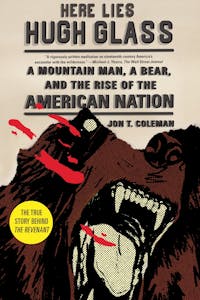Here Lies Hugh Glass
A Mountain Man, a Bear, and the Rise of the American Nation
 Download image
Download image
ISBN10: 0809054388
ISBN13: 9780809054381
Paperback
272 Pages
$16.00
CA$18.50
In the summer of 1823, a hunter named Hugh Glass was brutally mauled by a grizzly bear in the brush along a tributary of the Yellowstone River. Two comrades stayed with him at first, but soon abandoned him to the wilds. But Glass wouldn't die. He crawled and heaved his way to safety, then vowed revenge on those who had left him for dead.
Nearly all we know of this story comes from secondhand accounts published in journals and magazines that promised readers back east stories of the "true" untamed West. In Here Lies Hugh Glass, Jon T. Coleman delves into these often contradictory accounts, looking for both the real Hugh Glass and the myth that made him something more. Coleman provides a rich, eye-opening look at the trials of life on the early frontier. At the same time, the stories told about Glass offer a window onto the imagined frontier as it developed in the minds of a young nation.
Reviews
Praise for Here Lies Hugh Glass
"[A] vigorously written meditation on 19th-century America's encounter with the wilderness."—Michael J. Ybarra, The Wall Street Journal
"[Coleman] masterfully mines what scant life poor Glass left behind (one letter to the parents of a companion killed by the Arikara Indians) to argue convincingly that the bear attack story is one of the contributing factors in how Americans have come to think of themselves."—Stephen J. Lyons, Minneapolis Star Tribune
"[Coleman] shines a pure light on the actual conditions of the working man in the American West, on the fundamental relation between men, animals, and Native Americans, and on the many rascals and scamps, not to mention confidence men and counterfeiters, who are the real source of our greatest national myths."—Gaylord Dold, The Wichita Eagle
"Jon T. Coleman shows us how backwoods workers experienced a West that left them scarred and mutilated. These are the raw (and bloody) materials for America's tall tales, epic boasts, dime novels, and Wild West medicine shows."—Scott Nelson, Legum Professor of History, College of William & Mary
"Almost killed by a grizzly, almost erased by the passage of time, Hugh Glass is resurrected by Jon T. Coleman in this wise and witty book."—Karl Jacoby, Professor of History, Brown University
"Jon T. Coleman steers the horrendous story of Hugh Glass through the frontier writer James Hall, Herman Melville's ubiquitous Confidence Man, modern-day survivalism, advertisements for runaways, Richard Henry Dana, Henry David Thoreau, the social lives of grizzly bears, Timothy Flint, Davy Crockett, transnationality, a workingman's history of the fur trade, and much more as he uncovers and adds to Americans' long and unfinished conversation about the West."—Paul E. Johnson, Distinguished Professor of History Emeritus, University of South Carolina
"Jon T. Coleman tracks the many tales and few facts that surround the legend of Hugh Glass, whose improbable survival and quest for revenge crawls off the page and stays in your head."—Clyde A. Milner II, coauthor of As Big as the West: The Pioneer Life of Granville Stuart and coeditor of The Oxford History of the American West
"[Coleman's] writing is certainly audacious, not just in his colorful language . . . but also in his willingness to discard traditional disciplinary boundaries and in his exuberant mixing of history, folklore, literature, popular culture, and the natural sciences."—Nathan E. Bender, Library Journal


